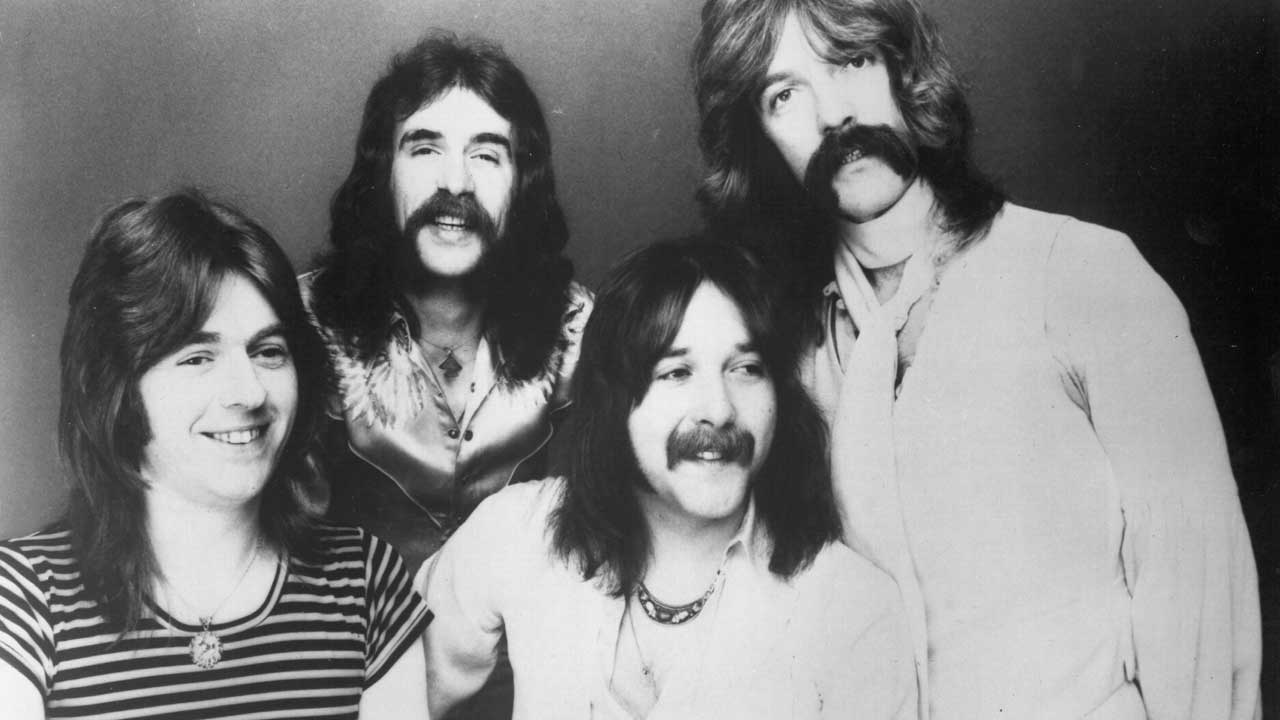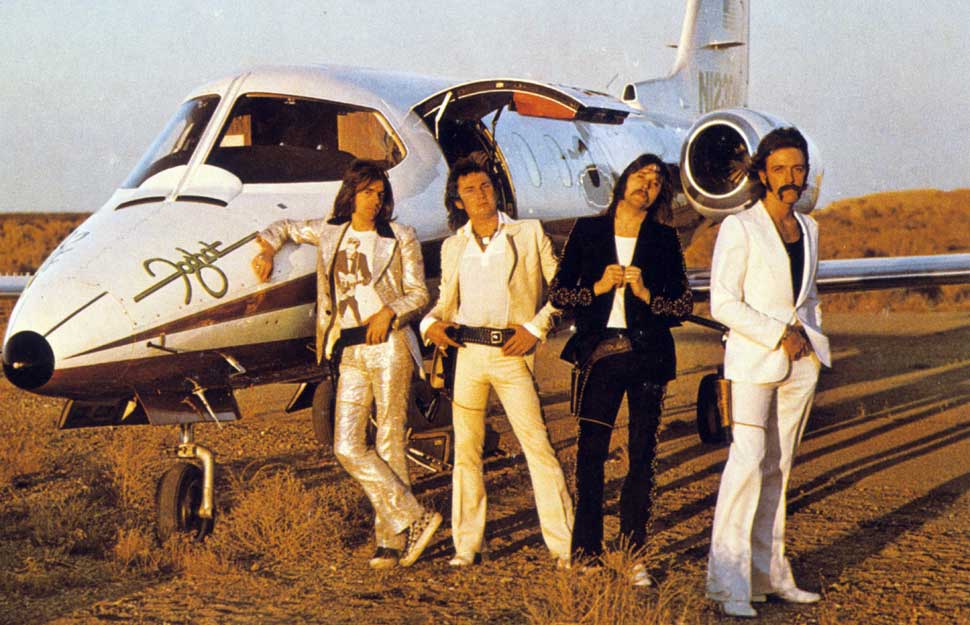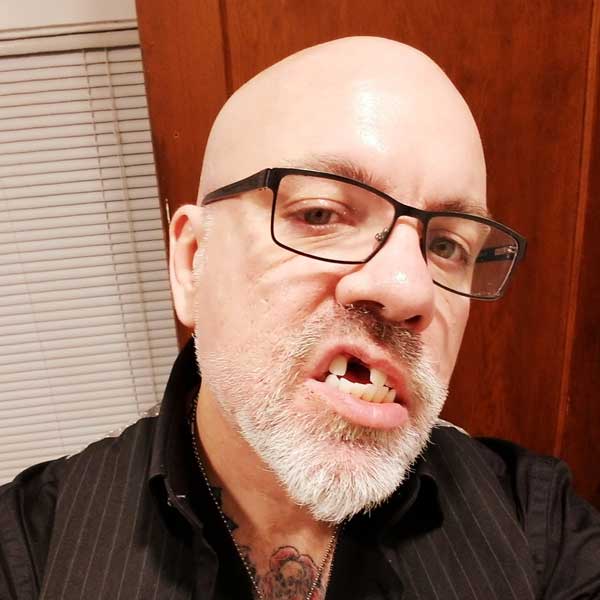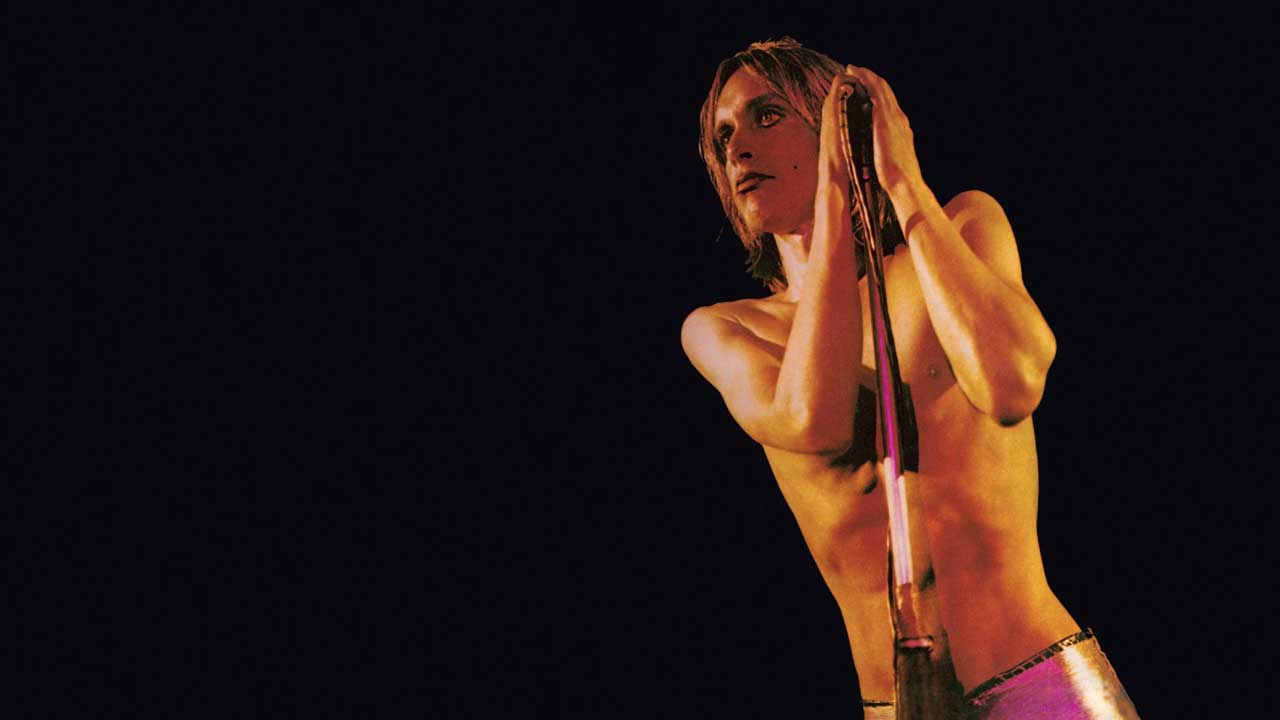"Rick Rubin said, 'I'd like to have the original Foghat and record them', so we buried the hatchet": The story of Foghat, who turned up the blues, grew huge moustaches, and became superstars
A celebration of the long-standing appeal of slow ridin’ rock’n’rollers Foghat, who chose their name from some jumbled-up Scrabble letters

Formed in London in 1971, Foghat successfully fused a god-given talent for no-holds boogie with extravagant facial hair, gaining enormous popularity Stateside for hits like Slow Ride and Fool For The City, In 2007, Classic Rock tracked them down and listened to stories of scrabble, non-stop touring, Rick Rubin, and a frontman called ‘Lonesome’ Dave.
I took this assignment seriously. I bought, at significant cost, a Dynamite eight-track player and loaded up on crackly old Foghat tapes, including classics like Fool For The City and Night Shift, and not-so-classics like their 1980 new wave detour Tight Shoes. I listened to them while lifting weights, kissing girls, and puking in the woods: all the things I remember the older idiots in my neighbourhood doing while Foghat’s signature classic Slow Ride blasted from boomboxes and rusty Chevys back in the 70s.
I even called my first girlfriend, Judy, who was a wild tangle of blonde hair and rock-chick abandon when we dated in the 80s. Judy saw Foghat live back then, and barely lived to tell about it. “They opened for Aerosmith at the Manning Bowl [near Boston],” she recalled. “That was a crazy fucking show, man. Lots of bikers and lots of blood. I was tripping out and kept saying: ‘Why are Foghat still playing the same song?’”
Now we’re getting somewhere. Now we’re digging in deep to the real Foghat experience. In the beginning they were Savoy Brown sidemen, Brit blues-rock journeymen looking for their own slice of rock glory. One mass defection and a drunken game of Scrabble later they were Foghat, the thunderboogie bosses with the big moustaches and even bigger amplifiers. The highway-hugging Brits were embraced by American punters as one of their own, and as the 70s wore on their stature as undisputed champs of heads-down, no-nonsense arena choogle only grew larger.
While disco killed most of their contemporaries, Foghat fought on. Hits were sparse, but long-lasting: I Just Want To Make Love To You, Drivin’ Wheel, Fool For The City and, of course, Slow Ride, which became the anthem of every chest-beating, denim-strutting lothario from New York to Los Angeles and all the way to ol’ Blighty itself.
Things slowed down in the 1980s, as flash and glamour held sway, and Foghat found themselves consigned to dinosaur status. The producers of Spinal Tap claimed they based their riches-to-rags story on the once mighty ’Hat, and the guys were hard-pressed to argue the allegations. The band began to serve as a pop-culture punch line.
But you can’t keep a good rock’n’ roll band down forever, and in the 1990s the boogie men returned triumphantly to the distinct pleasure of beer-swilling biker gangs and classic-rock holdouts the world over. In recent years they’ve been struck with tragedy, as two of their own have passed away, but they soldier on, intent on taking their slow ride all the way to the end of the line. Oh, and they’re not such scary dudes any more – although I’d still stay out of the front row.
Sign up below to get the latest from Classic Rock, plus exclusive special offers, direct to your inbox!

I call Foghat drummer Roger Earl at his home – “I’m living in a houseboat, terrorising the fish” – in Long Island, New York. Roger is the last original member of the band. The last Brit, as well. It’s been almost 40 years since he started Foghat, but he remembers every date and detail with the same precision he applies to the drum kit.
“When we left Savoy Brown in 1970 and formed Foghat, we recorded five or six songs, and we couldn’t get arrested,” Roger laughs. “Nobody wanted us.”
Roger, guitarist/vocalist ‘Lonesome’ Dave Peverett and bass player Tony Stevens were all relegated to hired-hand status by Kim Simmonds, Savoy Brown’s mercurial guitarist. And although the classic British blues-rockers were doing well at the time, the boys in the band were looking for something more.
“What happened was, we were out on the West Coast touring, and the band was doing great. We’d just released Looking In, and we had just got into doing some of the writing. Kim had a new record deal coming up. Up to that point we were just paid sidemen. He fired Tony Stevens, and he offered Dave and myself some points on the record, and a piece of the action. Dave and I thought about it and decided that maybe we wanted to make a go of it with something else. Kim was leaning towards a jazzy sort of thing, so we thought it was time to leave.”
The trio added guitarist Rod ‘The Bottle’ Price, and the hustle was on. “Our manager at the time took our demos around to all the major record labels and they all turned us down, everybody. The only person to say okay was Albert Grossman. He was the manager for Bob Dylan, The Band, Peter, Paul & Mary, Janis Joplin – a lot of big people. He was starting his own label, and he wanted a rock’n’’roll band on there, but he hadn’t found one.
“We set something up with him. We played at this little club – just us, and Albert standing in front of us. We cranked up the Hi-Watts and played six or seven songs for him, and he said: ‘Is there someplace we can go and eat cheese biscuits?’ So we went to this hotel across the road and sat in the lobby, and he said: ‘Okay, let’s do it.’ I can’t tell you how excited I was. After everybody else had turned us down, for somebody with Albert Grossman’s stature to say okay, that was really great.”
The band had songs and a record deal, but no name. ‘Lonesome Dave’ to the rescue. Years earlier, Dave had invented the word ‘Foghat’ during a game of Scrabble with his brother. It meant nothing, but was worth a few ill-gained points. Years later, the name came back up. “That comes from the Savoy Brown days,” Roger says. “It was after a show, we’d all had a few beers and decided we should all have pseudonyms. Dave had his name, ‘Lonesome’ Dave. I was Skins Willy, for some unknown reason. Kim, I think, was the Incredible Gnome, and Dave decided that Chris Youldon [vocalist] should be Luther Foghat. Chris couldn’t quite see that, though.”
If Chris didn’t want it, the band did, and so Foghat were born.“ When we told them our new name, the record label looked at us like we’d grown a new head,” Roger laughs.
Foghat’s self-titled first album was released in 1972, and earned them their first hit – a ballroom-blitzing cover of Willie Dixon’s oft-borrowed ode to illicit romance, I Just Want To Make Love To You. Foghat’s slam-boogie somehow managed to crack through the folk-rock haze that ruled the airwaves at the time.
“It was a great time to have a rock’n’roll hit,” Roger says, “because Carole King and James Taylor were in the charts. We didn’t think we had a chance.”
Although the song made little headway in the UK, it became a hit in the US, where Foghat’s simple recipe for rock’n’ roll (“We turned the blues up a bit,” says Roger) went down a veritable storm. So that’s where Foghat went. “It was a hit in the States, so we set up a tour. And I think the tour lasted 13 months.” He laughs. “We played everywhere. Weddings, Bar Mitzvahs, whatever.”
From there on in, Foghat stayed on an exhausting schedule of touring and releasing records, slowly building up a ravenous following of die-hards and motorheads. By the mid-1970s, life was good for Foghat. “We had a lot of money and new cars,” Roger says. “We did alright.”

In 1975, they released their Fool For The City album, which produced their most enduring hit, Slow Ride, an eight-minute super-jam with a concrete-cracking riff that smells of sex and motor oil.
“A lot of people tell me their kid was conceived to Slow Ride,” Foghat’s long-time bass player Craig MacGregor tells me.
Well, it’s long enough, I remind him.
“Exactly. I think that was the idea.”
MacGregor joined the band in 1975, during the mixing stages of Fool For The City. He was plucked from relative obscurity right before Slow Ride hit, and graduated to the arenas rather quickly.
“When I auditioned I had no idea who they were,” he confesses. “I had a band in Connecticut for, like, eight years called Swan. We played New Orleans at the Mardi Gras for six years in a row. I was playing down there and a friend of mine who was a disc jockey in New Haven, Barry Grant, did a show with Foghat. They mentioned to him that they were looking for a bass player and he gave them my name. They called me and I said: ‘Well, I have a band, I’m down here in New Orleans.’ They said: ‘Well, we’ll fly you out here, we’ll have a limousine waiting for you.’ And I thought: ‘Hmm. This seems pretty promising.’”
Craig took them up on their offer and became their first American member. “My first show was for 20,000 people,” he says. He even grew a Foghat-approved moustache. “Yeah, but I think Roger had the best one. It was big and bushy. We could go home after a nice meal and still taste it, it was wonderful.”
By that point, Foghat were at their biggest, touring around the US in punishing road campaigns with bands like Blue Öyster Cult, Styx, Wishbone Ash, Pat Travers and Montrose. And as the road got longer, the crowds got wilder.
“That rowdy bar crowd, that’s always been our thing,” Craig says. “That’s always been our market. One time when we played Alabama, they had had a snow storm and they closed the whole city down. The promoter told us he was considering cancelling the show, and this was a sold-out show. We told him not to worry, our fans will be there. They drive drunk, man, they’ll make it. And believe me, they did.”
By 1980, however, business began drying up. The band attempted to roll with the times, offering up the power-poppy Tight Shoes album, but the kids just shrugged. They trudged on for several more years, and that’s when the Spinal Tap rumours started.
“We never played any puppet shows,” Craig says, “But we did open for Cheech And Chong once.”
Exhausted and outdated, America’s favourite boogie men finally took a break in 1983. “Every dog has his day, right?” Roger asks me, rhetorically. “Well, this dog had been barking for a while.”
Although there has been a hiatus here and there, Foghat have never officially broken up. In fact, by the end of 1984 there were two warring Foghats to contend with.
“What happened was, Dave moved back to England in 1984,” Roger explains. “I took a break for about six months. Fixed the car, mowed the lawn, probably got drunk for too many days in a row. So I called up Craig MacGregor, who was the bass player in Foghat, and Eric Cartwright, who was our new guitar player. We put a new band together and started rehearsing in the music room in my house. We got a singer and a guitar player and called ourselves The Knee Tremblers. We had a couple Foghat songs in the set, and we started playing gigs. They started calling us Foghat, instead of The Knee Tremblers, so that’s how that happened.”
Roger christened his version Roger Earl’s Foghat, and the band played on. Then, in 1991, something quite interesting happened. “Producer Rick Rubin got in touch with our manager and said: ‘I’d like to have the original Foghat and record them.’ So Dave and I talked, and we said: ‘Let’s stop armwrestling around America.’ We buried the hatchet and moved on.” From there, assembling the rest of the originals was relatively easy.
“After me and Dave buried the hatchet, we called Rod Price, and he said okay. Rubin wanted Tony Stevens, who was the original Foghat bass player, to be on the record. Dave and I weren’t too happy with that, but he wanted the originals, so we got Tony in. And it’s alright. And then things break down with Rubin.”
While the idea of the bearded wunderkind of Def American revitalising the career of Foghat the way he did with The Cult, Glenn Danzig, Slayer or Johnny Cash is a tantalising one, that particular album was never made, for reasons still unclear to Roger.
“I don’t know to this day what happened with Rick Rubin,” he says. “I just got the notice one day that he was no longer doing the record.”
Still, the band were back together. They made the most of the situation. “We played some shows together and then took a break for a year. We got back together a year later and did the Return Of The Boogie Men record, but by this time Rod was struggling with some personal issues. When Rod was doing well he was a tremendous guitar player, full of fire. But it was just too difficult for him to tour. He had a real problem being in the public eye, whereas for me and Dave it was our lifeblood.”
Sadly, Rod Price died in 2005. “He had a heart attack and fell down the stairs at home,” Roger explains. “They think it was the fall that killed him, because he was quite overweight. But I think he found some joy before he died. He was a little-league coach for his son’s baseball team, and he was teaching guitar in New Hampshire. So I think he was happy. I went to his funeral up there, and I was the only one there from his musical past. It was quite sad. But I had to be there, whether he wanted me there or not.”
As for Foghat, as ever, the band played on. But things were getting tougher. The band’s spiritual leader, ‘Lonesome’ Dave, was stricken by kidney cancer in the mid-1990s, prompting them to take a two-year break in 1997.
“We started playing again in 1999, but Dave was still sick. He was in remission, and he wanted to play. When I first saw him, he had lost a lot of weight, but even though the flesh was weak, his spirit was extremely willing. Within two weeks on the road, he was bouncing around and sweating and having a great time. It was one of the most enjoyable tours we ever did together.”
‘Lonesome’ Dave Peverett finally succumbed to his illness in 2000. It was a devastating blow, but Roger felt Dave would have wanted them to continue.
“Dave was the heart and soul of this band,” Roger says. “Even when he started to get sick, he was still great to play with.”
The revamped version found Craig MacGregor back in the band after leaving in 1991, as well as a new frontman, Charlie Huhn, former guitarist/ vocalist for Jerry Shirley’s Humble Pie, Ted Nugent, Victory and others. The band have been active ever since. But these days, despite keeping busy, Foghat are finally taking their own advice. They take it easy.
“One thing that’s interesting about being in a band at my age, in my 50s, is that everybody’s more mature, and over all these petty issues we dealt with when we were younger,” Charlie Huhn says. “There’s no baggage. It’s wonderful. And everybody’s like that, all the survivors in this rock’n’roll pension plan that we’re in.”
Said pension plan still involves lots of touring, only these days they prefer the friendly skies to the never-ending road. “We fly out now,” says Roger. “We’re out for three or four days, and then we’re back for another three of four. You get to be home and see the kids, it’s very civilised.”
Craig explains how it works. “All our equipment is on our rider, so we don’t have to haul any gear. We all live in different parts of the country, so our travel agent gets us all in one airport within an hour of each other, and we go from there. We’ve done something like 80,000 miles since the end of last May. These days we primarily play outdoor festivals. Any indoor gigs are usually Indian casinos. They always treat us very well. They are awesome places to play.” Charlie agrees: “At the casinos they want to pay us way too much money to play way too short a set.”
There is also a new studio album in the works but, as Roger tells me, it may be a while before you hear it. “We are going in the studio in the autumn. It may take us a year, maybe longer. It’s not a race any more.”
So then: a happy ending, a rarity in rock’n’roll. When I ask Roger if he plans on retiring any time soon, he laughs. “In the immortal words of ‘Lonesome’ Dave,” Roger says, “I’m gonna roll ’til I’m old, I’m gonna rock ’til I drop. That’s my plan.”
Foghat's next album, Last Train Home, was finally released in 2010. It was followed by Under the Influence (2016) and Sonic Mojo (2023). Craig MacGregor died in 2016, and Charlie Huhn left the band in 2022. Roger Earl is still rockin'.
This feature originally appeared in Classic Rock 108, published in August 2007. Foghat are currently on tour.
Came from the sky like a 747. Classic Rock’s least-reputable byline-grabber since 2003. Several decades deep into the music industry. Got fired from an early incarnation of Anal C**t after one show. 30 years later, got fired from the New York Times after one week. Likes rock and hates everything else. Still believes in Zodiac Mindwarp and the Love Reaction, against all better judgment.

